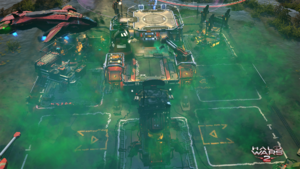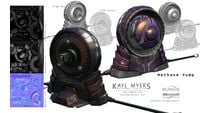Methane: Difference between revisions
From Halopedia, the Halo wiki
No edit summary |
m (Text replacement - "\|(right|thumb)(\|[^\]\n]+)?\|(right|thumb)" to "|thumb$2") |
||
| Line 2: | Line 2: | ||
{{References}} | {{References}} | ||
{{Wikipedia|Methane}} | {{Wikipedia|Methane}} | ||
[[File:HW2_MethaneFirebase.png| | [[File:HW2_MethaneFirebase.png|thumb|300px|A UNSC [[Firebase]] covered in methane.]] | ||
'''Methane''' is a chemical compound with the molecular formula CH<sub>4</sub>. It is the simplest alkane, and the principal component of natural gas. Methane's bond angles are 109.5 degrees. Burning one molecule of methane in the presence of [[oxygen]] releases one molecule of CO<sub>2</sub> (carbon dioxide) and two molecules of [[Water|H<sub>2</sub>O]]. | '''Methane''' is a chemical compound with the molecular formula CH<sub>4</sub>. It is the simplest alkane, and the principal component of natural gas. Methane's bond angles are 109.5 degrees. Burning one molecule of methane in the presence of [[oxygen]] releases one molecule of CO<sub>2</sub> (carbon dioxide) and two molecules of [[Water|H<sub>2</sub>O]]. | ||
Latest revision as of 11:33, April 12, 2023
| This article does not have enough inline citations and/or does not adhere to the proper citation format. You can help Halopedia by adding citations. |
| There is more information available on this subject at Methane on the English Wikipedia. |

Methane is a chemical compound with the molecular formula CH4. It is the simplest alkane, and the principal component of natural gas. Methane's bond angles are 109.5 degrees. Burning one molecule of methane in the presence of oxygen releases one molecule of CO2 (carbon dioxide) and two molecules of H2O.
Methane is a relatively potent greenhouse gas with a high global warming potential of 72 (averaged over 20 years) or 25 (averaged over 100 years). Methane in the atmosphere is eventually oxidized, producing carbon dioxide and water. As a result, methane in the atmosphere has a half life of seven years (every seven years, the amount of methane halves). Methane's relative abundance and clean burning process makes it a very attractive fuel. However, because it is a gas (at normal temperature and pressure; see STP), methane is difficult to transport from its source. In its natural gas form, it is generally transported in bulk by pipe or LNG carriers.
The only known species that uses methane instead of oxygen in respiration are the Unggoy. Their home planet, Balaho has an atmosphere which is mostly methane. Because of this, the Unggoy use methane tanks and breathing apparatus when operating outside their native environment. While methane is needed for a Grunt to live, Grunts enjoy another gas, benzene, as a drug, calling it "lovely lung gold" and "sacred aromatic".[1] Additionally, the Unggoy frequently mix narcotics called infusions into their methane supplies.[2] The lungs of the SPARTAN-IVs are augmented to process a variety of toxins and foreign gases, potentially allowing them to breathe methane for around an hour.[3]
Methane is highly flammable, and as such the Covenant's methane containers - including the Unggoy's methane tanks - explode when shot. During the Second Ark Conflict, the Unggoy Yapyap would utilise Methane as a weapon, deploying it from Methane Wagons to choke enemy troops and enhance his own Unggoy forces.[4]
During the Battle for Zeta Halo, the Banished troops stationed at the Redoubt of Sundering used methane gas to execute human POWs they deemed to be too weak or of no value.[5]
Gallery[edit]
Sources[edit]
- ^ Halo: Ghosts of Onyx, page 237
- ^ Halo: Contact Harvest, pages 150-151
- ^ Halo: Initiation, Issue #2
- ^ Halo Wars 2
- ^ Halo: The Rubicon Protocol, page 160
